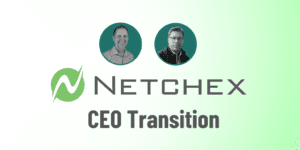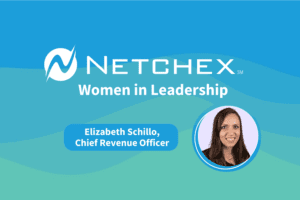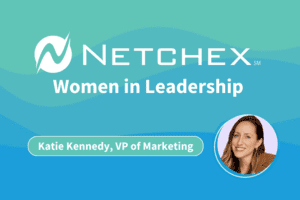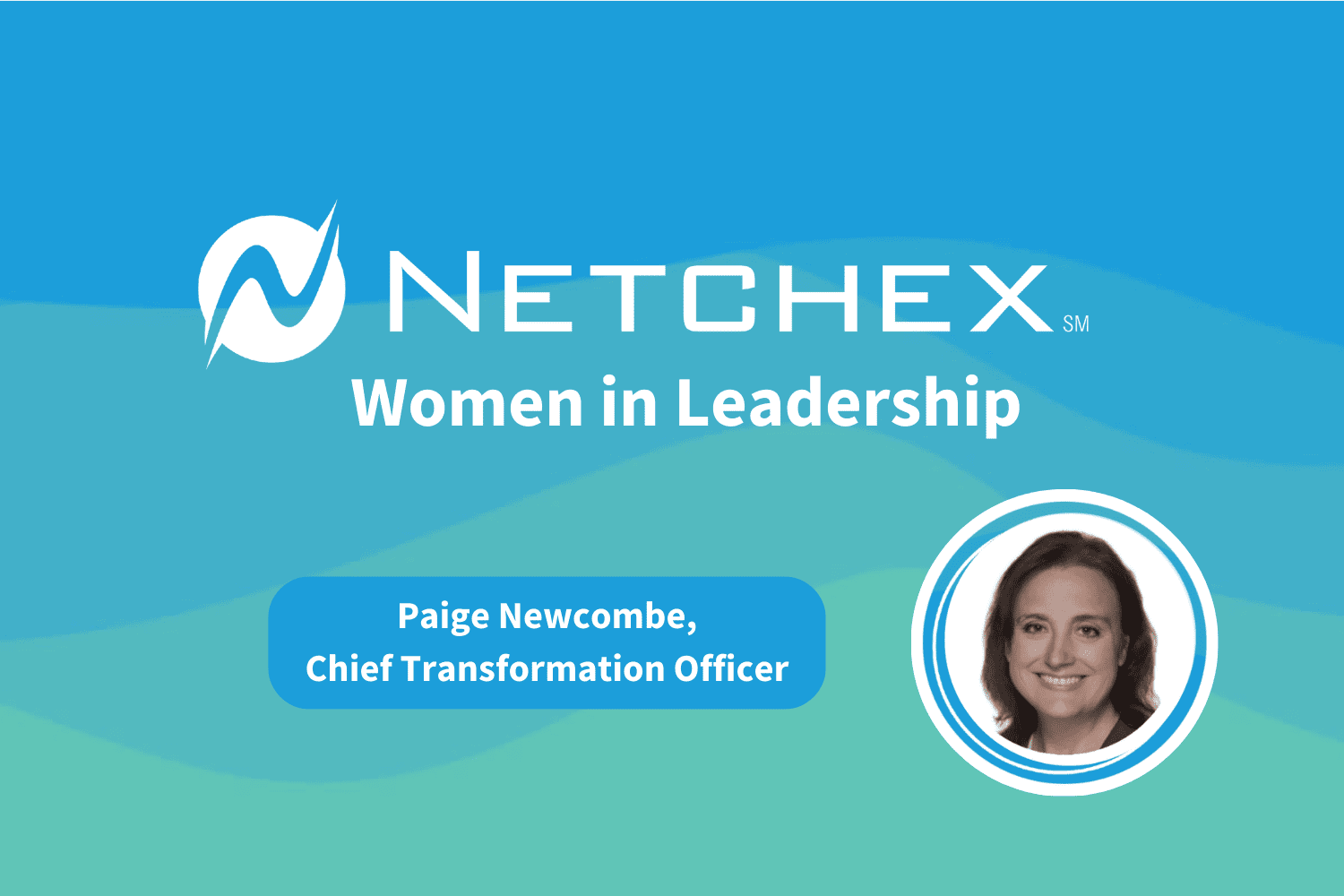Share
March is Women’s History Month. To mark this occasion, the Netchex Diversity, Equity, & Inclusion Council is honoring the many powerful women in leadership at Netchex.

In our Netchex Women in Leadership series, we’ll hear from our female leaders about career journeys, challenges, inspirations, and advice.
Next up is Paige Newcombe, Chief Transformation Officer. We talked to her about her career journey, her leadership style, and the bright future on the horizon for Netchex.
Could you give us a little background information on what your role entails as the Chief Transformation Officer?

My role is a new role—not just at Netchex, but kind of a new role in the industry. A Chief Transformation Officer typically leads operational and strategic guidance across an organization preparing itself for accelerated growth.
My role here is to look at the customer journey from the moment a prospect signs an agreement to become a customer, and then their entire journey as a customer. How we onboard them, how we train them, and how we continuously engage with them, so that our customers become stickier and even happier than they are today as they continue to grow and expand their footprint with us.
Looking at different digital technologies and operational efficiencies so that our customers continue to have a second-to-none experience—an even better experience than before. We do that in a way with a level of technology savviness as well.
Can you share a little bit about your career journey, and how everything that you’ve done in your career has led to this point?
I’ve had a really varied career. My career actually started out in sales and account management. And then kind of moving up through leadership.
As I was finishing my MBA with a focus on global business and business strategy, I went into consulting. It was through consulting that I had an opportunity to work with a variety of different companies—different sizes and different types of businesses—leading the marketing strategy vs. go-to-market versus operation.
From there, I jumped back into technology and have been in, for the most part, client-facing roles, whether it’s leading go-to-market or operations. Then, a trip through M&A and business development as well.
So, it’s been quite a varied ride, but almost everything has been through the lens of the customer. I’m pretty excited about the role that I’m in here.
Looking back on your career journey, do you feel like there are certain milestones or experiences that really helped shape who you’ve become today?
I think two, in particular—and they both have a lot of similarities. One was working in consulting and the other was in M&A. I think that exposure to two different types of businesses and different business models allowed me to come into situations and view things with a fresh eye.
Having a variety of experience—smaller sized companies, startups, publicly traded companies and privately held ones—has really helped give some exposure and experience.
How would you describe your leadership style? And how did those experiences shape your leadership style?
For me, it’s all about setting a vision, right? Everyone needs to know, where are we going? What is that North Star? So, to align a team together around the vision, to set clear objectives, and to strategize on what the plan is for us to get from here to there.
When we move, we move as a team—it can’t be a bunch of individual groups. So, for me, team and group meetings are very important. Alignment across teams is key and it’s critical for everybody to move and sync together.
It’s so important who we surround ourselves with. Even as leaders, I think that we have leaders that we look up to for that mentorship and support—to build us up, bounce ideas off of.
Speaking of mentorships, did you have women in leadership that really helped you? Whether it was just being an inspiration or giving you that advice as you grew in your leadership role?
Yes, there’s 2 women in particular, who I’ve never had the pleasure of meeting, but they’re really inspirational women to me.
One is Sheryl Sandberg, former COO of Facebook (Meta). I thought Lean In was one of the most impactful books I have ever read when it first came out years ago. And that is, how do you have that voice? And how do you create that voice?
The other is Martha Stewart. She wrote a business book many years ago, and there’s a concept in there that I have taken everywhere with me. It is the concept of the three lenses: using a telescope for vision, using a wide angle lens to work horizontally and create relationships, and then, being an expert in something where you can pull out your microscope. Knowing when to use which lens. If you can master that, then you can excel.
What is some specific advice that you would get other women looking to become leaders in our industry?
Never, ever stop learning—particularly in our industry. Technology moves at such a rapid rate of pace. Never stop learning and never stop thinking about what could be next.
You know that old saying: if it ain’t broke, don’t fix it. I don’t think that that really applies in technology. Because if you’re not thinking about what’s next, you will be left behind. So, it’s really about never, ever stopping learning.
And then, it’s not about me, it is about the fact that we get absolutely nowhere unless we do it together. So, providing support and building the relationships of those around you is what is going to elevate you and elevate the business.
Are there specific skills or qualities you believe are crucial for success for women in leadership?
I think it’s to be inquisitive, right? Learn, learn, learn, and be supportive to everybody around you. If you’re in a leadership role, it’s about creating leaders around you, creating your own succession plan.
Are there any exciting projects or initiatives that you’re actively working on here at Netchex?
Yes, actually. Reimagining net retention. Although that sounds kind of boring, I know, it’s really all about what is every single step in the customer journey, so that we’re servicing them before they know that they need service. Ensuring we have insight into them and that we are intelligent about our customers, so our customers will want to stay with us, expand, and grow. Looking at every single aspect and mapping out that client journey. Looking at ‘what is the journey today’ vs. ‘what is the journey of the future’ is wildly exciting for me.
The second part of that is bringing the voice of the customer into the organization. How do we give the customer a voice in our technology, our services, and our account management. With a programmatic approach, we can then synthesize that information and take action on it and make sure that our customers know that they are being heard. I think our business is better when we are in touch with what our customers need, not just today, but what their needs could be a year from now.
How do you see our industry evolving in the coming years? And what trends do you think will have a significant impact?
I think technology, and business in general, is going through a digital transformation. Having insight into customers and artificial intelligence allows us to do that. Implementing tools that allow us to have insight will allow us to be proactive in the way we service our customers. What I mean by that is giving our customers something before they even know they need it.
The second thing is implementing technology and tools that allow us to operate a lot more efficiently—things like Salesforce Einstein Insights and ChatGPT. These give us information at our fingertips that will allow us to better serve the customer. Also allow the customer to self-serve or have less of a need to directly contact us. And what that will do is really shift our conversations with customers so that they’re going to become a lot more consultative and prescriptive.
I think that’s going to require us to really invest in skilling and upskilling individuals within the organization. It’ll make us become very targeted with how we bring talent into the organization that can move with us as technology is changing our business.
Is there any advice that you give to aspiring women in leadership?
The last thing would be that change is inevitable. We are going to go through a lot of change, and sometimes, it’s uncomfortable and that’s okay. Also, know that you have a voice, too. And it’s okay to bring your voice forward.
Hold on to what that vision could be for the future and get excited about it because Netchex has a lot of cool things going on right now. This is an amazing company. Where we’re going to be in just a couple of years shows that Netchex is a company for the future.
Previous installments of the Women in Leadership series:
- Katie Kennedy, VP of Marketing
- Kelly Kennedy, VP of Finance
- Elizabeth Schillo, Chief Revenue Officer
Discover how your company can empower women in the workplace from Netchex’s women in leadership:
- 10 Substantial Ways to Empower Women in the Workplace
- Addressing Gender Inclusivity in the Modern Workplace
- How Can HR Help Support and Retain Working Mothers?
Industry news & tips sent straight to your inbox!
Enter your email below to subscribe to industry news, product updates, and tips.
Related articles

Netchex Founder-CEO Shifts Role and Welcomes New CEO

Netchex Women in Leadership: Elizabeth Schillo, Chief Revenue Officer

Netchex Women in Leadership: Kelly Kennedy, VP of Finance

